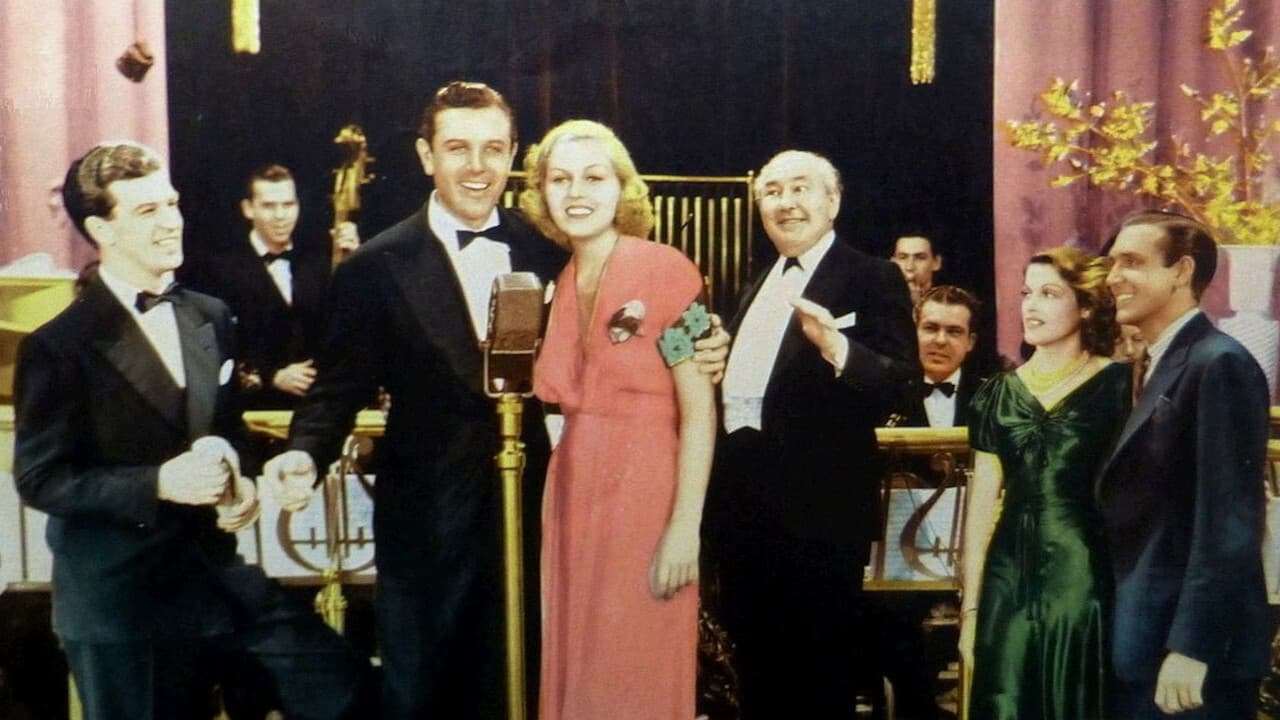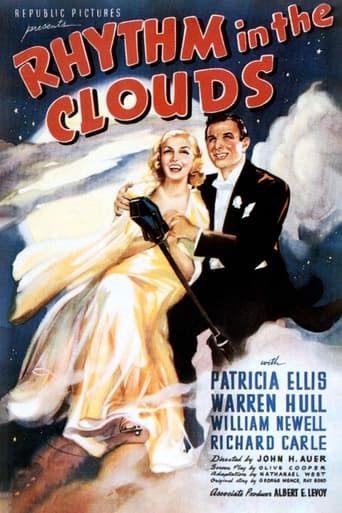Konterr
Brilliant and touching
Gurlyndrobb
While it doesn't offer any answers, it both thrills and makes you think.
Neive Bellamy
Excellent and certainly provocative... If nothing else, the film is a real conversation starter.
Ezmae Chang
This is a small, humorous movie in some ways, but it has a huge heart. What a nice experience.
Cristi_Ciopron
A musical comedy with Patricia Ellis (as the rocketing songwriter) and Suzanne Kaaren (as the temperamental singer); Suzanne Kaaren had, a few yrs after this movie, a supporting role (and a distinguished billing) in a crazy science comedy with Lugosi. In this movie, R. Carle does again one of his confident, irascible, and senile showbiz bosses, which is his stock character; W. Hull and R. Paige look somewhat similar …. After almost 80 yrs, these people are still offering their beautiful songs …. It is uplifting to watch people behaving well and with dignity, and this may be at least one of the pleasures given by this genre; in this movie, this ideal world is lively and endearingly conveyed. Here, the storyline is well handled, and occasionally sexy. It's a B movie, but a crafty one: mainly, a good comedy, with cool songs. They knew not to gnash; they were saner.Comedy, songs, cast, direction are well assorted, and I feel glad to recommend an accomplished B movie. We are spared the occasional Condescendence towards women, of the screwballs from that age.The blonde lead, a likable girl, not especially talented, though _conqueringly zany, and who certainly deserved her role, manages to upstage the other players with her beautiful tits.
mark.waltz
A struggling songwriter, thrown out "gently" by her landlady (who is kind enough to tell her at 1:00 she doesn't have to rush; the new tenant is moving in at 3:00), manipulates her way into the apartment of an already established composer, pretending to be a relative, and predictable complications happen. The rise to success is spectacularly fast, the "relative" returns, and a fairy godmother (in the guise of a feisty countess) helps her to achieve her dreams. All in the matter of under an hour in this silly but watchable screwball comedy with a few minor songs. Not much to praise here; It's all pretty unbelievable and ordinary, but the game leads (Patricia Ellis and Warren Hull) and some memorable supporting players (particularly the always scene-stealing Zeffie Tilbury as the very American countess and the underrated Esther Howard as the landlady) make this mildly pleasant.
csteidler
Patricia Ellis is cute as struggling songwriter Judy Walker. Thrown out of her cheap apartment, she wrangles a much nicer place using a letter she received from a much more successful songwriter, the letterhead on his stationery, and a bottle of "ink eraser." Basically, she moves into his place while he is out of town.The new apartment is awfully nice—an excellent place to work on her songs. There is, unfortunately, a loud neighbor next door; Judy and the neighbor quickly start a noisy war of banging on each other's walls. For the most part, however, Judy is set. She lounges on the couch drinking champagne, sharing high-toned conversation with her imaginary guests: "Mr. Gershwin, take it easy. Of course I'll help you write your new rhapsody….Mr. Berlin! Irving! Do tell the boys how many copies of our last number we sold....Now, Bob McKay—Let me see those lyrics of yours…." We assume that "Bob McKay" is another well-known songwriter; soon enough we learn that…The guy next door with whom Judy has been fighting through the wall is indeed popular lyricist Bob McKay—a big star and an enthusiastic feuding partner. Naturally, it takes Judy and Bob a good chunk of the picture to discover each other's identities; the scene where they finally make that realization is nicely done and quite funny—it's one of those scenes where you can see it coming but that makes it all the funnier. That scene is typical of the picture as a whole, actually: never especially surprising but pleasantly amusing nevertheless.Warren Hull is pretty good as Bob McKay, the lyricist next door; Hull and Ellis make a nice couple, two attractive people snapping dialog back and forth and gradually getting together. The supporting cast have some decent roles: Richard Carle plays the exasperated head of an advertising agency looking for songs; William Newell is the assistant whose job includes rounding up the talent and getting fired every time Carle is in a bad mood; Zeffie Tilbury is hilarious as "the Duchess de Lovely," whose beauty cream products sponsor the radio program Carle is producing. There's not much to it, but it's easy to look at these beautiful people in their classy outfits and stylish apartments and sparkling radio studio settings. My favorite line: "Does 'resignation' have two g's?" "I don't know, I always get fired."
ptb-8
This tedious 'musical' from 1937 was clearly an A grade Republic production maybe hoping to tag along on the bottom half of a double bill with a smart A grade film from MGM or Paramount. Very well produced with lavish and well furnished big sets and some style RHYTHM IN THE CLOUDS is basically a company calling card or showreel of Republic's 'expertise'... but...someone forgot to create something for the audience to enjoy. Screenplay by Nathaniel West (Of Day Of The Locust fame...he also later adapted Let's Make Music for RKO) who must have used a blunt pencil for this one. An A grade film out of Republic was a B+ for RKO or Columbia which might indicate the level of expertise on show. Basically it is about a dishonest female music arranger sneaks into the apartment of a vacationing composer and creates the impression they are collaborating. Her music with his name on it too. It becomes a hit and makes the radio. He returns: "screwball situations" . It just isn't very interesting. A no-star cast who might have been Boston stage actors recently and a forgettable music score makes this film dull. If you want to some ambitious production imagery and set design and camera work etc hard at work at Republic in their early days of 1937 here it is. A 30s production curio only. Amusingly, it is what Grand National or later in 1937, Monogram was striving for.

